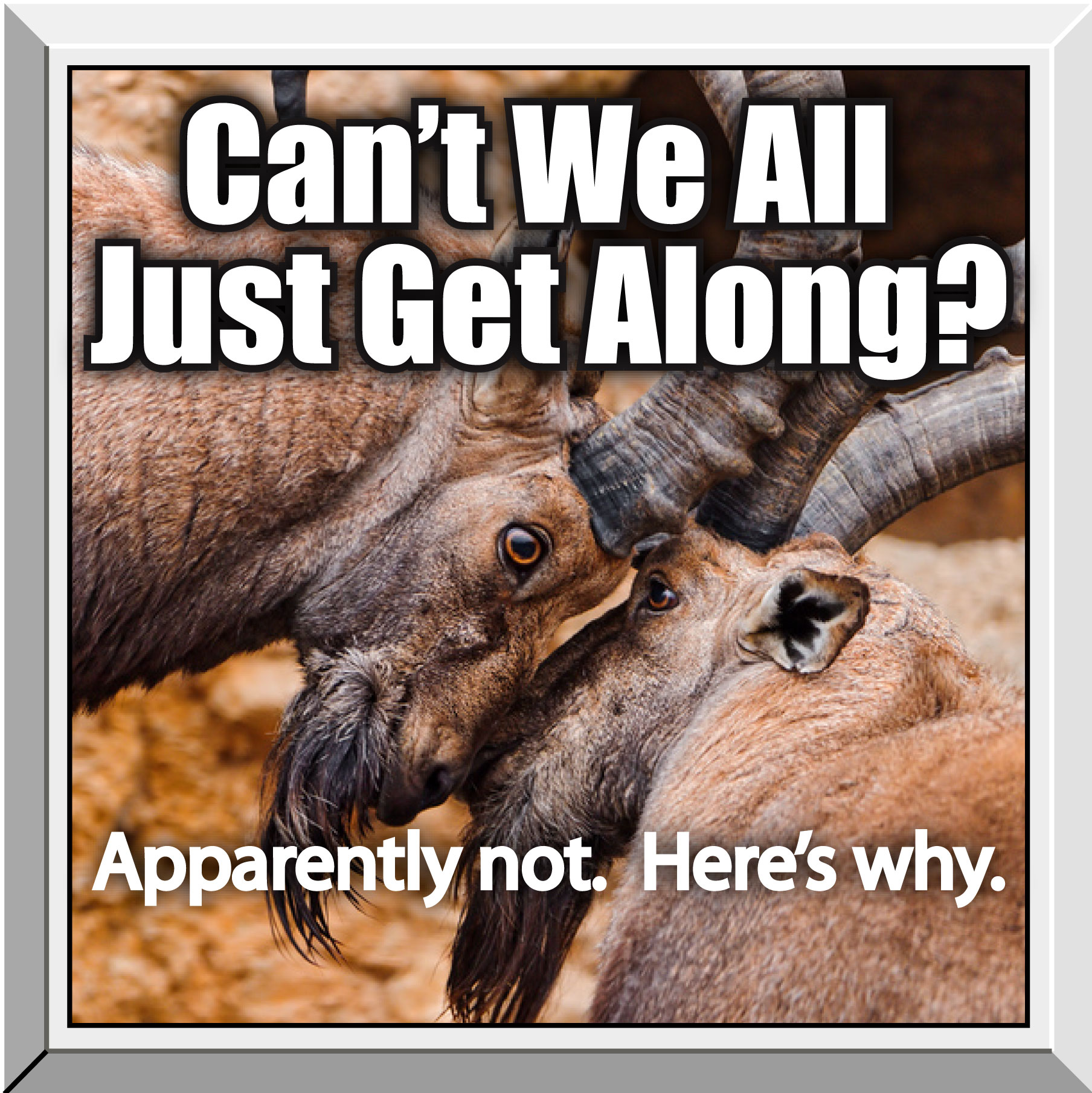 It’s not news that our country is going through a period of hyper-partisanship. Nothing, it seems, is beyond politics and even demonstrable facts make little difference to entrenched ideological positions. Rodney King’s plaintive cry, “Can’t we all just get along?” resonates again with all of us, so much so that some people are beginning to shake off the blinders of politics and reach across the aisle to their fellow Americans. Are we shaking off a fog of confusion? Is there real reason to hope for real change?
It’s not news that our country is going through a period of hyper-partisanship. Nothing, it seems, is beyond politics and even demonstrable facts make little difference to entrenched ideological positions. Rodney King’s plaintive cry, “Can’t we all just get along?” resonates again with all of us, so much so that some people are beginning to shake off the blinders of politics and reach across the aisle to their fellow Americans. Are we shaking off a fog of confusion? Is there real reason to hope for real change?
Apparently not. We hate to be buzzkills on this, but science has uncovered fascinating (if depressing) evidence that much of the way we see the world, much of what makes that partisan divide so gaping, is hard-wired. In fields like sociology, anthropology, economics, biology, psychology, and more, new tools and techniques are giving us insights into the deepest parts of the human psyche, and the results can be pretty scary to those who like to believe our opinions have some relevance to facts.
Our “Your Car Matters” staff combs through mountains of information to produce this newsletter, and not every story we read deserves a full article by itself. But bit by bit, they sometimes add up to something important. We’ve been squirreling away studies and reports on the deep causes of why humans see the world the way we do, and there’s no better time than today, in the midst of the Trumpocracy, to share them with you. You probably won’t want to read all these articles unless you’re working on a doctoral thesis of some type, but pick a few at random… you’ll find they point in the same general direction.
The research paints a dim picture. It seems much of what we think of as “reasoning” to a conclusion is actually “justification” for conclusions we’ve already reached in our subconscious, which can be influenced by things we’ll never be explicitly aware of. And once we form these opinions we have built-in mechanisms to protect them, regardless of how true (or not) they might be.
But on the other hand, there is a ray of sunlight to put it all into perspective. All these studies deal with how we form worldviews to begin with. They don’t deal with what we do with those worldviews once we have them.
One of the things that sets human intelligence apart is that (at least many of us) are self-reflective. We might form opinions in our subconscious, but what we do with those opinions is a matter of conscious choice. If we realize how susceptible we can be to subconscious influence, we can, in fact we’re obligated to, use our conscious thought to overcome our animal brains. Facts and reality are not subject to our choices, but our responses to them are, and understanding why we think the way we do makes us better at thinking more effectively at all. As Socrates said, “The unexamined life is not worth living”. That may or may not be true, but the unexamined life definitely makes it harder for us to all get along. And the examined life is always within our reach.
Digging very, very deeply…
Conservatives and Liberals Have Different Brains, Studies Show, by Sydney Lupkin on ABC News, Sep 2012
What Shapes Your Political Beliefs at 18, 35, and 50, by Natalie Jacewicz on NYMag Science of US, Apr 2017
New Studies Suggest Liberals Are As Blinkered And Biased As Conservatives, by Christian Jarret in the Research Digest of the British Psychological Society, Apr 2017
The Devil In All Of Us? The Stanford Prison Experiment, by Charles Letherwood, Your Car Matters, Jun 2015
The Power Of Framing: It’s Not What You Say, It’s How You Say It, by Steve Rathje in The Guardian, Jul 2017
Human Brain Function May Be Organized Differently Than Scientists Have Thought, by Renee Morad on Seeker, Apr 2017
The Mindset That Makes It Hard to Admit You’re Wrong, by Dr. Susan Whitbourne in Psychology Today, Mar 2017
America In Crisis: Is A Second Civil War In The Making? By Richard Striner on History News Network, Jun 2017
For A Modest Personality Trait, ‘Intellectual Humility’ Packs A Punch, on Medical Express, Mar 2017
More Human Than Thou… Or Just Better? Our Motivation To Think We’re Good Trumps Our Desire To Feel Human, by Alex Fradera in the Research Digest of the British Psychological Society, Mar 2017
The Most Important Communication Skill You Will Ever Need, by Susan Krauss Whitbourne in Psychology Today, Jul 2017
Why Facts Don’t Convice People (And What You Can Do About it), video by Brave New Films, Jun 2017
Our Brains Judge a Face’s Trustworthiness—Even When We Can’t See It by James Devitt on the NYU website, Aug 2014
New Paper Provides Evidence-Backed Insights On How Not To Come Across As A Jerk, by Alex Fradera in the Research Digest of the British Psychological Society, Jul 2017
Psychologists Have Identified The Kind Of Emotional Intelligence That Makes Internet Trolls So Mean, by Cassie Werber on Quartz, Jul 2017
Americans Want to Live in a Much More Equal Country (They Just Don’t Realize It), by Dan Ariely in The Atlantic, Aug 2012
How To Get People To Overcome Their Bias, by Tom Stafford on BBC, Jan 2017
Conducting The Milgram Experiment In Poland, Psychologists Show People Still Obey, Dolinski et al on ScienceDaily, Mar 2017
How To Pop Your ‘Filter Bubble’, BBC News Video, Jun 2017
Online Purchas Patterns Show Left-Wingers And Right-Wingers Read Very Diferent Science Books, by Alex Fradera in the Research Digest of the British Psychological Society, Jun 2017
Were you once a conservative but are now a liberal? Were you once a liberal but are now a conservative? How did it feel? Answer thread on Quora, 2017
Culture Affects How People Deceive Others, Study Shows, ScienceDaily, Jun 2017
Harvard Study Holds a Clue on How to Combat Political Vitriol, by Annie Holmquist in Intellectual Takeout, Jun 2017
Why Don’t Some People Believe In Science? On Seeker, Nov 2016
Conspiracy Theorists May Really Just Be Lonely, by Matthew Hutson in Scientific American, May 2017
Shocking Discovery? Money Earned By Exploitation Is Less Rewarding, Study Shows, by Hannah Devlin in The Guardian, May 2017
As News Approaches, Even Optimists Brace For The Worst, by Christian Jarrett in the Research Digest of the British Psychological Society, May 2017
Is This How Discrimination Ends? By Jessica Nordell in The Atlantic, May 2017
The psychology behind that popular new comic from ‘The Oatmeal’, by Cross, Martinez, and Galarreta on KPCC website, May 2017
Donald Trump And The Slippery Slope To Becoming A Prolific Liar, by Brian Resnick on Vox, May 2017
The Dark Allure Of Conspiracy Theories, Explained By A Psychologist, by Brian Resnick on Vox, May 2017
Explicitly Teaching Critical Thinking Skills in a History Course, by Anne McLaughlin and Alicia McGill on SpringerLink, Mar 2017
How the Science of “Blue Lies” May Explain Trump’s Support, by Jeremy Smith in Scientific American, Mar 2017
Distress, Status Wars And Immoral Behaviour: The Psychological Impacts Of Inequality, by Nick Haslam on The Conversation, Mar 2017
Fake News Spreads Because People Trust Their Friends Too Much, by Jesse Singal on NYMag Science of US, Mar 2017
How to Criticize with Kindness: Philosopher Daniel Dennett on the Four Steps to Arguing Intelligently, by Maria Popova on Brain Pickings
The Effects Of Social Identity Threat And Social Identity Affirmation On Laypersons’ Perception Of Scientists, by Nauroth et al on Sage Journals, Feb 2016
Living a Lie: We Deceive Ourselves to Better Deceive Others, by Matthew Hutson in Scientific American, Apr 2017
How East and West Think In Profoundly Different Ways, by David Robson on BBC.com, Jan 2017
Talking in Euphemisms Can Chip Away at Your Sense of Morality, by Niemi et al on NYMag Science of US, Apr 2017
People Who Are Curious About Science Are More Open-Minded About Politics, by Tracy Staedter on Seeker, Jan 2017
Should Students be Taught to Argue Rationally? By Annie Holmquist on Intellectual Takeout, May 2016
Are There Emotional No-Go Areas Where Logic Dare Not Show Its Face? By Richard Dawkins on the Richard Dawkins Foundation for Reason & Science, Jul 2014
The Hypothesis- Why Do People Want What They Want? By Satoshi Kanazawa in Psychology Today, Mar 2010
A Major New Study Shows That Political Polarization Is Mainly A Right-Wing Phenomenon, by Dan Kennedy on WGBH Website, Mar 2017
Understanding The Role Of Offender History In Mitigating Moral Blame Requires New Insights Into How People Think About Free Will, by Dr. Michael Gill on Society for Personality and Social Psychology, Jun 2017










